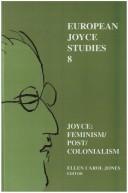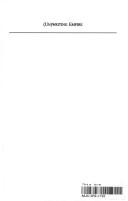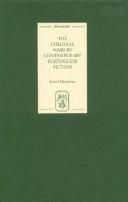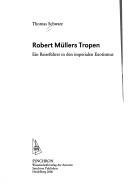| Listing 1 - 10 of 487 | << page >> |
Sort by
|

ISBN: 9789004490741 9789042007710 Year: 1998 Publisher: Leiden;Boston BRILL
Abstract | Keywords | Export | Availability | Bookmark
 Loading...
Loading...Choose an application
- Reference Manager
- EndNote
- RefWorks (Direct export to RefWorks)
James Joyce is located between, and constructed within, two worlds: the national and international, the political and cultural systems of colonialism and postcolonialism. Joyce's political project is to construct a postcolonial contra-modernity: to write the incommensurable differences of colonial, postcolonial, and gendered subjectivities, and, in doing so, to reorient the axis of power and knowledge. What Joyce dramatizes in his hybrid writing is the political and cultural remainder of imperial history or patriarchal canons: a remainder that resists assimilation into the totalizing narratives of modernity. Through this remainder - of both politics and the psyche - Joyce reveals how a minority culture can construct political and personal agency. Joyce: Feminism / Post / Colonialism , edited by Ellen Carol Jones, bears witness to the construction of that agency, tracing the inscription of the racial and sexual other in colonial, nationalist, and postnational representations, deciphering the history of the possible. Contributors are Gregory Castle, Gerald Doherty, Enda Duffy, James Fairhall, Peter Hitchcock, Ellen Carol Jones, Ranjana Khanna, Patrick McGee, Marilyn Reizbaum, Susan de Sola Rodstein, Carol Shloss, and David Spurr.
Book
ISBN: 9789004525986 9789004525917 Year: 2022 Publisher: Leiden, The Netherlands : Brill,
Abstract | Keywords | Export | Availability | Bookmark
 Loading...
Loading...Choose an application
- Reference Manager
- EndNote
- RefWorks (Direct export to RefWorks)
Long before the issue of colonialism in Joseph Conrad's works became a prominent topic in Conrad studies, Florence Clemens initiated this conversation and began the dialogue that has since become a crucial scholarly conversation.
Book
ISBN: 1743320019 1743327714 9781743327715 9781743320006 1743320000 1743320159 9781743320150 9781743320013 Year: 2013 Publisher: Sydney : Sydney University Press,
Abstract | Keywords | Export | Availability | Bookmark
 Loading...
Loading...Choose an application
- Reference Manager
- EndNote
- RefWorks (Direct export to RefWorks)
Australia and the World celebrates the pioneering role of Neville Meaney in the formation and development of foreign relations history in Australia and his profound influence on its study, teaching and application.
English literature. --- Imperialism in literature. --- Intellectual life.

ISBN: 9042004614 9042004711 9004433597 Year: 1998 Publisher: Amsterdam Rodopi
Abstract | Keywords | Export | Availability | Bookmark
 Loading...
Loading...Choose an application
- Reference Manager
- EndNote
- RefWorks (Direct export to RefWorks)
The contributors to the present volume, in espousing and extending the programme of such writers as Edward Said, Benedict Anderson, Homi Bhabha, and Gayatri Spivak, lay bare the genealogy of 'writing' empire (thereby, in a sense, ' un -writing' it). One focus is the Caribbean: the retrograde agenda of francophone crolit ; the re-writing of empire in the postmodern disengagement of Edouard Glissant; resistance to post-colonial allegiances, and the dissolving of binary categories, in contemporary West Indian writing. Essays on India, Malaysia, and Indonesia explore various aspects of cultural self-understanding in Asia: un-writing high culture through hybrid 'shopping' among Western styles; the use of indigenous oral forms to counter Western hegemony; romantic and anti-romantic attitudes towards empire and the land. A shift to Africa brings a study of Nadine Gordimer's feminist un-writing of Hemingway's masculinist colonising narrative, a searching analysis of Soyinka's restoration of ancient syncretic elements in his West African re-visions of Greek tragedy, changing evaluations of the validity of European civilization in Andr Gide's representations of Africa, and tensions of linguistic allegiance in Maghreb literature. North America, finally, is brought back into the imperial fold through discussions of Melville's re-writing of travel and captivity narratives to critique the mission of American empire, Leslie Marmon Silko's re-territorialization of expropriated Native American oral traditions, and Timothy Findley's representation of Canada's troubled involvement with its three shaping empires (French, British, American).
Comparative literature --- Thematology --- Imperialism in literature. --- Decolonization in literature.

ISBN: 1282621211 9786612621215 1846156181 1855661586 Year: 2008 Publisher: Woodbridge, Suffolk, UK ; Rochester, NY : Tamesis,
Abstract | Keywords | Export | Availability | Bookmark
 Loading...
Loading...Choose an application
- Reference Manager
- EndNote
- RefWorks (Direct export to RefWorks)
The Portuguese fiction that awakened public debate on imperialism The colonial wars in Angola, Mozambique and Guinea-Bissau in the 1960s and 1970s were Portugal's Vietnam. The novels discussed in this study, written by António Lobo Antunes, Lídia Jorge and Manuel Alegre among others, aroused passionate responses from the reading public and initiated a national debate, otherwise lacking in the contemporary press, with their systematic deconstruction of the rhetoric of patriotism and colonialism of António Salazar's regime. The author's approach is of necessity grounded in postcolonial thought, as these works represent the awakening of a post-imperial conscience in Portuguese literature and society. ISABEL MOUTINHO is a Lecturer in Spanish and Portuguese at La Trobe University, Australia.
Portuguese fiction --- Imperialism in literature. --- History and criticism. --- Portugal --- Colonies
Book
ISBN: 9788494830198 8494830198 Year: 2018 Publisher: Madrid: Pliegos,
Abstract | Keywords | Export | Availability | Bookmark
 Loading...
Loading...Choose an application
- Reference Manager
- EndNote
- RefWorks (Direct export to RefWorks)
Spanish literature --- Nationalism and literature --- Imperialism in literature
Book
ISBN: 9781644530801 1644530805 Year: 2012 Publisher: Chicago University of Delaware Press
Abstract | Keywords | Export | Availability | Bookmark
 Loading...
Loading...Choose an application
- Reference Manager
- EndNote
- RefWorks (Direct export to RefWorks)

ISBN: 3935025866 9783935025867 Year: 2006 Publisher: Heidelberg Synchron
Abstract | Keywords | Export | Availability | Bookmark
 Loading...
Loading...Choose an application
- Reference Manager
- EndNote
- RefWorks (Direct export to RefWorks)
Exoticism in literature --- Imperialism in literature --- Müller, Robert,
Book
ISBN: 1800855036 1846315263 Year: 2009 Publisher: Liverpool : Liverpool University Press,
Abstract | Keywords | Export | Availability | Bookmark
 Loading...
Loading...Choose an application
- Reference Manager
- EndNote
- RefWorks (Direct export to RefWorks)
This book instructs readers who want to feel their ways through disciplinary conventions towards new and clearer understandings of how empires and texts shiver and fall, and why. Literature makes a difference to the ways that these questions are asked and explored. A cavalcade of writers has written about empire, femininity, Spain, pain, wounds, war and love. Symptoms of imperial panic abound in their pages, very frequently manifesting directly or indirectly in allusions to Spain and things Spanish.
Imperialism in literature. --- Feminist literary criticism. --- Spain --- In literature.
Book
ISBN: 9780801898495 Year: 2011 Publisher: Baltimore Johns Hopkins University Press
Abstract | Keywords | Export | Availability | Bookmark
 Loading...
Loading...Choose an application
- Reference Manager
- EndNote
- RefWorks (Direct export to RefWorks)
| Listing 1 - 10 of 487 | << page >> |
Sort by
|

 Search
Search Feedback
Feedback About UniCat
About UniCat  Help
Help News
News